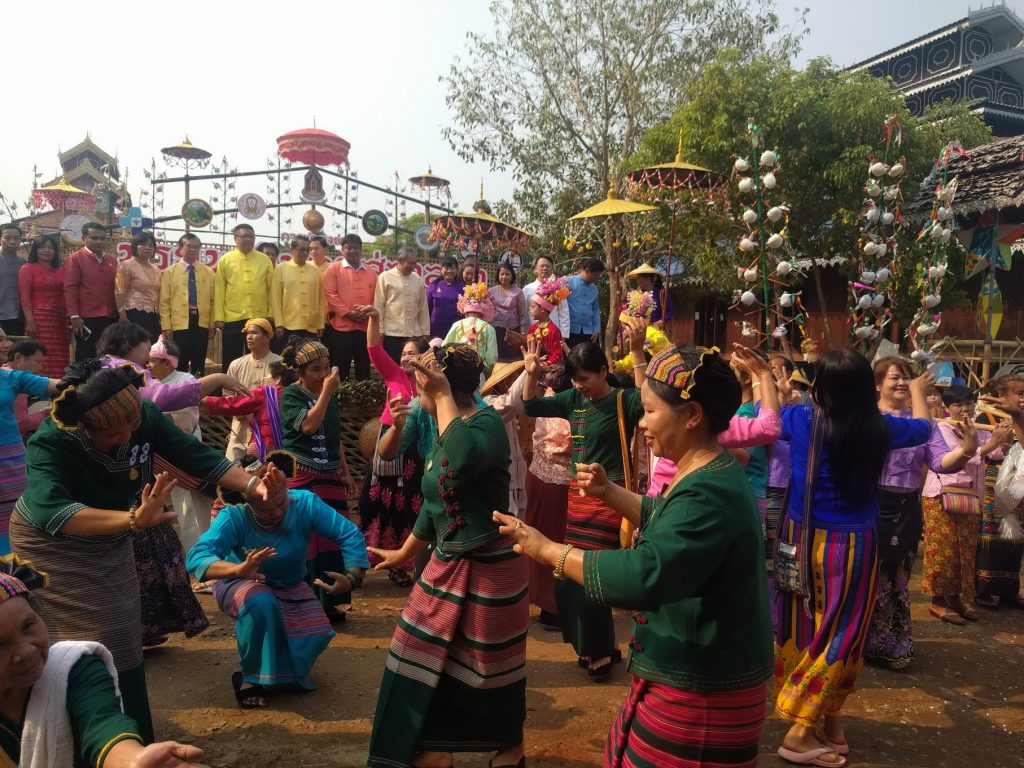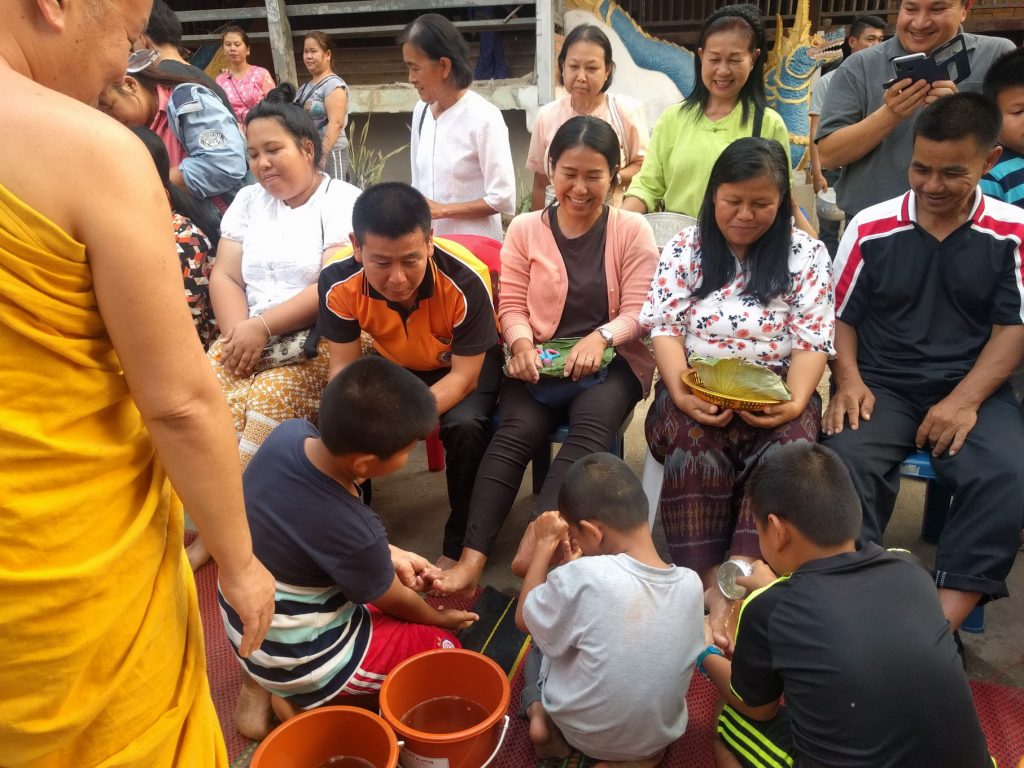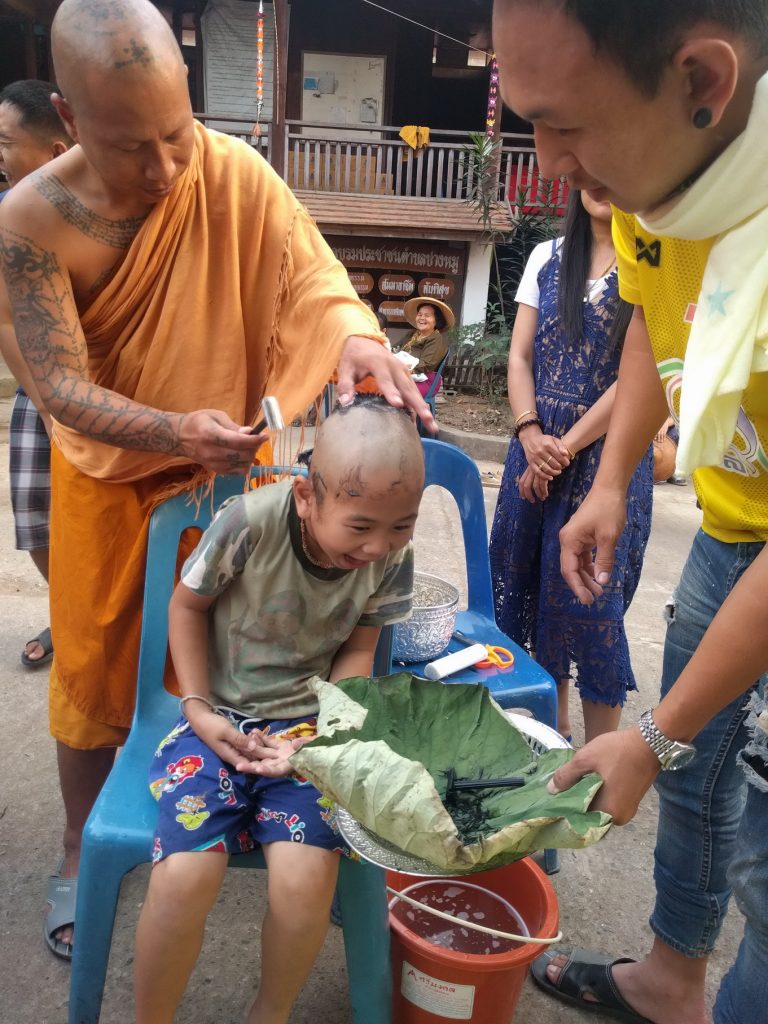The day is marked by the continuous beats of drums and cymbals and high pitched ‘woos’. To the side, a small boy learns the dance from a joyful elder, bending his knees at each beat, his hands out and waving up and down to the rhythms of the song. Men and women are busy sweeping and hosing down the area in preparation of festivities to come, while other family members chatted and hovered around casually. A couple of dozen colourful plastic chairs line up in front of the temple waiting to be filled.

It’s the first day of Poi Sang Long, where every year dozens of boys aged 7-14 are ordained as novice monks in Mae Hong Son. Translated as ‘Festival for the Crystal Sons’, Poi Sang Long is an annual multi-day festival of the Shan people, also known as Thai Yai people. After the festival, the ordained boys will study at monasteries for a period of time ranging from a week to many months or more. Across Northern Thailand, novices go through ordination ceremonies, but there is none as unique, bright and colourful as the Shan’s, and the place to see it in its full glory is in Mae Hong Son.
As the adults finish the preparations outside, a group of ten boys are sprawled out on the wooden floor inside the temple, playing thumb wars, making armpit farting noises and wrestling. A monk walks by to check in on them, and they all sit upright. “Yang kap,” they respond politely to a question lost in the din, before turning back to monkey business.

They’re in their street clothes now, but soon they will undergo the first step towards novice monkhood – getting their heads shaved. In the following days they will be decked up with full-faced makeup, ornate outfits, and bright flower crowns, emulating Buddha’s royal background before he gave up his worldly possessions. Once they are dressed up, the boys are not allowed to touch the ground, and will be carried around on others’ shoulders for the remainder of the celebration. Earlier in the day we saw a preview set up for press, and I was struck by the joy, colour, and sense of community of the procession. Women dancing to the drum and cymbal beat, everyone crying “Woo!” together, over and over again.
For a family to participate, it costs about four to five thousand baht per boy, and I’m told that every family wants to have at least one ‘sang long’, crystal son. If they don’t have a son, they can pay a relative or another family who has more than one son to be their sang long. In the Buddhist tradition, parents believe that having a sang long is a part of their ‘stairway to heaven’, members of the Thai media team explain to me.

Chubby, nerdy, and mischievous, the boys are eventually seated on a mat in front of their parents, who quickly fill up the plastic chairs. Relatives bring buckets of holy water (the water is brownish from the tamarinds), and the boys begin to wash their parents’ feet in the first part of the ceremony. A monk walks back and forth, checking their progress and heckling the boys as they go, entertaining all the relatives and family gathered. The boys take this task very seriously, really get up in there, scrubbing vigorously between toes, and some also wash their grandparents’ feet as well. Are you finished yet? The monk asks. “Krup”, the finished boys respond with pride.
Once their parents’ feet are clean, the boy begin to kiss their parents’ feet one by one. “Ik krang nung”, one more time, the monk says, laughing, to a boy who double checks his mom’s feet for cleanliness before kissing them. Another family erupts in laugher when their son vigorously washes his mouth with the holy water after kissing his parents’ feet. The boys are then instructed to wai to their parents, to thank them for all that they’ve done, and to say sorry, the other intern on the trip explains to me. It is sweet to witness this special moment of respect.

Finally, the shaving begins. Parents shampoo their sons’ heads, use scissors to cut off the longer bits (“Eep!” a kid yelps as he sees his first tuft of hair fall) and the head shaving begins. It’s a bit hectic at first, a father handing 40 baht to an older boy, who returns on his motorcycle with razors from the nearby Tesco. “Jep, jep, jep,” some boys exclaim in pain, while a few of the older ones attempt to look blasé.
The crowd of relatives watch happily, laughing at squirming boys and the hilarious monk, and record the rite of passage on video cameras and smartphones. A grandma has been recording the whole ceremony, only to realise she’s been on selfie mode the whole time…but luckily a young couple sees this and intervenes, helping her to flip the camera back. The intern and I watch an older man swipe away tears as his wife continues the shaving process. “Someone crying because for parent this is life goal,” he says, smiling.
The ceremony wraps up before sunset, the boys feeling out their freshly shaven heads. As the media team boards the van heading through the mountains back to the city, one of the reporters turns to me and smiles. “Happy moment.”
To see the festival in full swing, visit Wat Hua Wiang in Mae Hong Son on April 2-5. For this year’s full schedule, visit https://www.tatnews.org/event/poi-sang-long-festival-2019/.